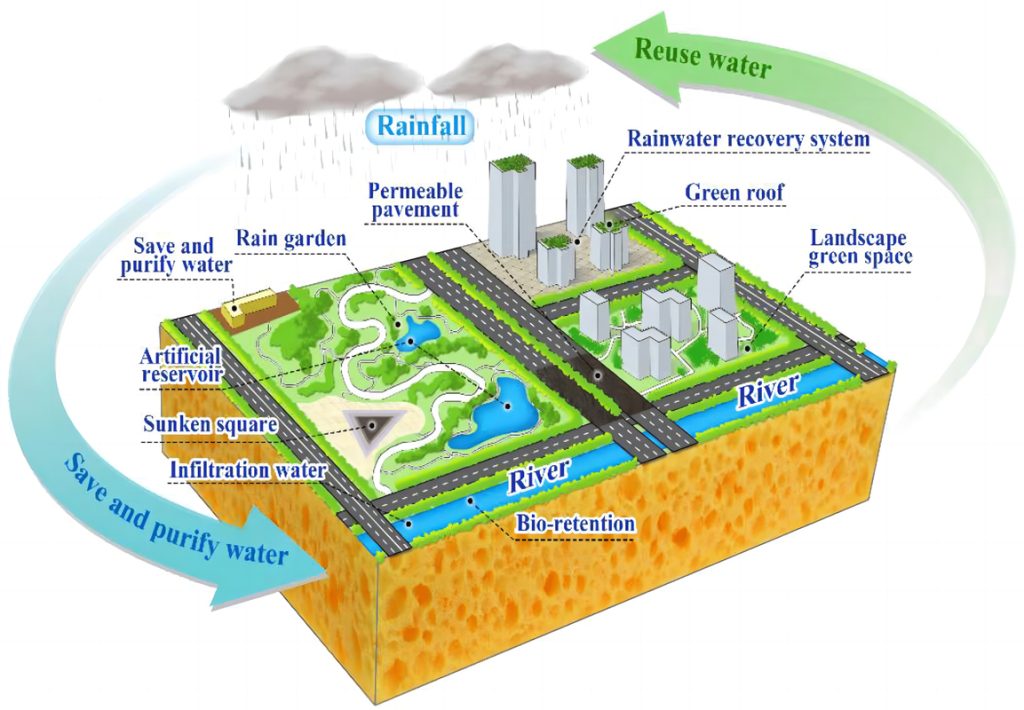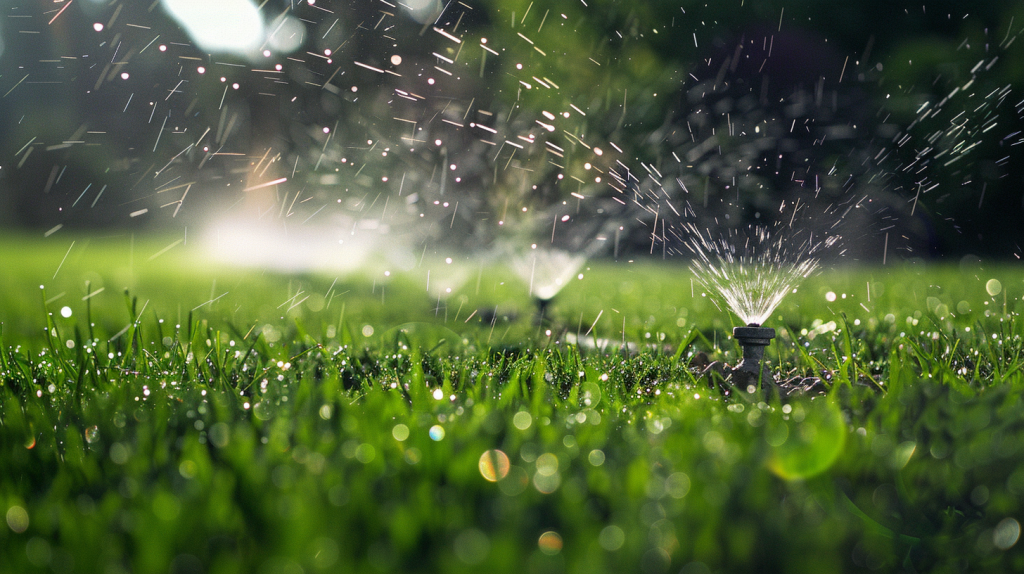Sponge City Solutions | Integration with Nature | Low Impact Stormwater System Development
Sponge city is a new urban construction concept that aims to effectively manage and utilise rainwater through a variety of natural and engineering means. Its objectives are to alleviate urban flooding, enhance water quality, replenish groundwater, and improve the overall ecological environment. By absorbing, storing, infiltrating and purifying rainwater, sponge cities mimic the natural water cycle system and promote sustainable urban water management.
Sponge City Solutions | Creating Resilient And Sustainable Cities
1. Permeable Pavements
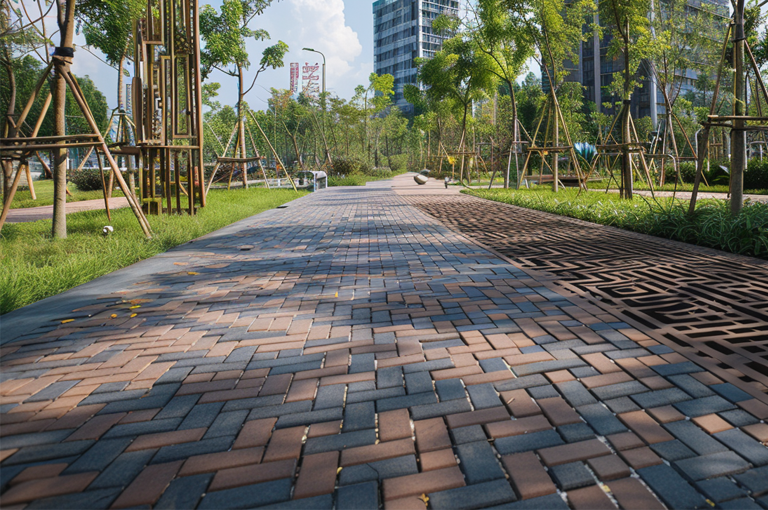
Applications:
- Sidewalks and Pedestrian Areas: Permeable pavements can be used in sidewalks and pedestrian pathways to manage rainwater where people walk.
- Parking Lots: Implementing permeable surfaces in parking areas helps manage large volumes of rainwater.
- Driveways: Residential driveways can utilize permeable pavements to reduce runoff from homes.
- Public Squares: Public spaces and plazas can integrate permeable pavements to handle rainwater effectively.
Benefits:
- Flood Mitigation: Reduces surface runoff and prevents urban flooding by allowing rainwater to infiltrate the ground.
- Groundwater Recharge: Facilitates water infiltration, helping replenish groundwater supplies.
- Pollution Control: Filters pollutants as water seeps through, improving groundwater quality.
- Urban Heat Island Mitigation: Supports water evaporation and adjacent vegetation, reducing urban temperatures.
- Durability and Maintenance: Long-lasting and requires less maintenance compared to traditional impermeable surfaces.
2. Green Roofs
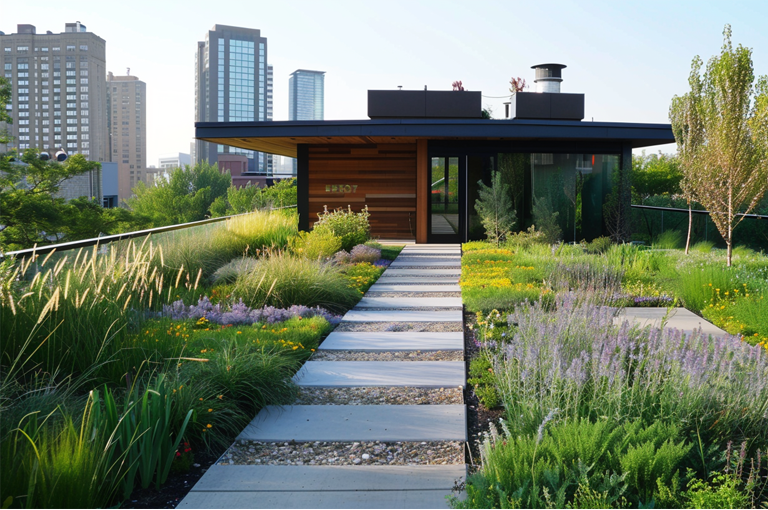
Applications:
- Residential Buildings: Can be installed on homes to manage rainwater and improve insulation.
- Commercial Buildings: Offices and shopping centers can use green roofs to reduce runoff and energy costs.
- Public Buildings: Schools, libraries, and government buildings can benefit from green roofs for stormwater management.
- High-Density Areas: Urban centers can utilize green roofs to mitigate heat islands and provide green spaces.
Benefits:
- Stormwater Management: Absorbs and retains rainwater, reducing runoff and easing drainage systems.
- Insulation and Energy Efficiency: Provides natural insulation, reducing heating and cooling costs.
- Urban Heat Island Reduction: Cools surrounding air through evapotranspiration.
- Biodiversity Enhancement: Creates habitats for birds, insects, and other wildlife.
- Aesthetic and Recreational Value: Enhances building appearance and provides recreational spaces.
3. Retention Ponds
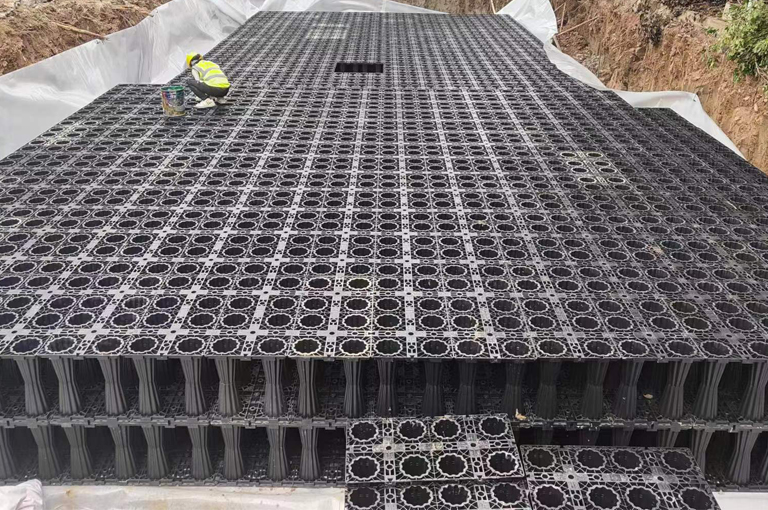
Applications:
- Urban Parks: Incorporated into parks to manage stormwater and provide recreational areas.
- Residential Complexes: Used in housing developments to manage runoff and create community amenities.
- Commercial Developments: Integrated into business parks and shopping centers for stormwater management.
- Industrial Areas: Helps manage runoff and improve water quality in industrial zones.
Benefits:
- Flood Control: Temporarily stores stormwater runoff, gradually releasing it to prevent flooding.
- Water Quality Improvement: Allows pollutants to settle, improving water quality.
- Groundwater Recharge: Facilitates slow infiltration of water into the ground.
- Wildlife Habitat: Provides habitats for aquatic plants and animals.
- Aesthetic and Recreational Spaces: Enhances urban landscapes and offers recreational opportunities.
4. Rain Gardens
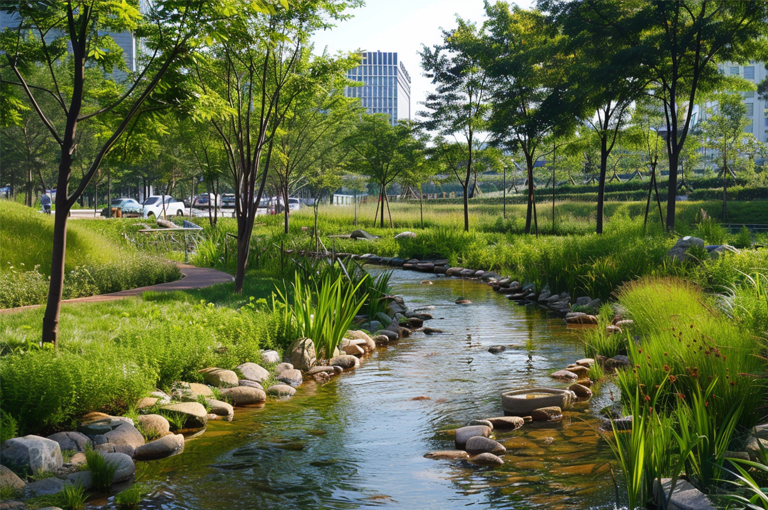
Applications:
- Residential Yards: Installed in yards to manage runoff from roofs and driveways.
- Public Spaces: Used in parks and along streets to capture and treat stormwater.
- Commercial Properties: Integrated into landscapes of offices and shopping centers.
- Community Projects: Developed as part of community beautification and stormwater management initiatives.
Benefits:
- Stormwater Absorption: Captures and absorbs rainwater runoff, reducing surface runoff.
- Pollution Filtration: Filters pollutants through soil and plants, improving water quality.
- Groundwater Recharge: Promotes infiltration, helping replenish groundwater supplies.
- Urban Cooling: Cools the air through evapotranspiration.
- Biodiversity Support: Provides habitats for various plant and animal species.
- Aesthetic Value: Beautifies urban areas with green landscapes.
Advantages of Yude's Sponge City Solutions
1. Advanced Permeable Pavements
- Efficient Rainwater Infiltration: Yude’s permeable pavements allow for quick infiltration of rainwater, reducing surface runoff and preventing urban flooding.
- Durability and Low Maintenance: These pavements are designed for high durability and require minimal maintenance, making them cost-effective in the long term.
- Pollution Control: By filtering pollutants as water seeps through, they improve the quality of water entering the groundwater system.
2. Innovative Green Roofs
- Enhanced Insulation: Yude’s green roofs provide superior insulation, reducing heating and cooling costs for buildings.
- Stormwater Management: These roofs absorb and retain significant amounts of rainwater, reducing runoff and easing pressure on drainage systems.
- Biodiversity Promotion: They create habitats for wildlife, enhancing urban biodiversity and contributing to ecological balance.
- Aesthetic Improvement: Green roofs add visual appeal to buildings and can be used as recreational spaces, improving urban living conditions.
3. Effective Retention Ponds
- Flood Control: Yude’s retention ponds are designed to store large volumes of stormwater, gradually releasing it to prevent flooding and erosion.
- Water Quality Improvement: These ponds allow for sedimentation and pollutant removal, improving the quality of water that is recharged or discharged.
- Ecological Benefits: Retention ponds provide habitats for aquatic life and can be integrated into urban green spaces, supporting local ecosystems.
- Recreational Spaces: They enhance the aesthetic value of urban areas and can be used for recreational activities, contributing to community well-being.
4. Efficient Rain Gardens
- Localized Stormwater Management: Yude’s rain gardens effectively capture and absorb rainwater runoff from impervious surfaces, reducing localized flooding.
- Pollution Filtration: The plants and soil in rain gardens filter out pollutants, improving the quality of water that infiltrates into the ground.
- Groundwater Recharge: By promoting infiltration, these gardens help replenish groundwater supplies, supporting sustainable water management.
- Urban Cooling: Vegetation in rain gardens cools the surrounding air through evapotranspiration, mitigating the urban heat island effect.
- Aesthetic and Recreational Value: Rain gardens enhance the visual appeal of urban spaces and provide pleasant, green areas for residents to enjoy.
5. Comprehensive Siphonic Drainage Systems
- Efficient Water Channeling: Yude’s siphonic drainage systems efficiently channel rainwater from rooftops and other surfaces, reducing the risk of flooding.
- Leak Prevention: The use of HDPE pipes and advanced welding techniques ensures high-quality, leak-free drainage systems.
- Durability: These systems are highly durable, resistant to impact, and suitable for a wide range of temperatures, ensuring long-term reliability.
- Cost Savings: The efficient design and installation of siphonic drainage systems reduce construction time and costs.
6. Flexible Rainwater Harvesting Modules
- High Capacity Storage: Yude’s rainwater harvesting modules provide large-capacity storage solutions, effectively collecting and storing rainwater for various uses.
- Versatility: These modules can be flexibly combined based on actual needs, making them suitable for different geographic environments and locations.
- Sustainable Water Use: Harvested rainwater can be used for irrigation, flushing, and cleaning, reducing reliance on municipal water supplies.
Addressing the challenges of urban overdevelopment!
Transform Your Urban Environment with Yude’s Sponge City Solutions
Are you ready to enhance the sustainability, resilience, and beauty of your city? Yude’s innovative sponge city solutions provide the comprehensive approach needed to tackle urban water management challenges effectively.
Why Choose Yude’s Solutions?
- Advanced Technology: Our permeable pavements, green roofs, retention ponds, and rain gardens integrate the latest technologies for superior performance and durability.
- Environmental Impact: Reduce flooding, improve water quality, and support biodiversity with our eco-friendly solutions.
- Economic Benefits: Save on long-term maintenance and infrastructure costs while increasing the aesthetic and functional value of urban spaces.
- Community Enhancement: Create healthier, greener, and more enjoyable urban environments for residents and visitors alike.
Take the Next Step Towards a Sustainable Future
Contact Yude Today to learn how our sponge city solutions can transform your urban landscape. Whether you’re a city planner, developer, or community leader, we have the expertise and products to meet your needs.
Applications Of Sponge City Solutions
Sponge city solutions aim to manage rainwater sustainably, mitigating urban flooding, improving water quality, recharging groundwater, and enhancing urban ecosystems. By incorporating natural hydrological processes into urban planning, these solutions help create resilient and sustainable cities.
Frequently Asked Questions (FAQ) About Yude’s Sponge City Solutions
1. What is a sponge city?
A sponge city is an urban area designed to manage rainwater efficiently by mimicking natural hydrological processes. The goal is to mitigate flooding, improve water quality, replenish groundwater, and enhance urban ecosystems through the use of green infrastructure and sustainable water management practices.
2. How do permeable pavements work?
Permeable pavements are made from materials that allow water to pass through them, infiltrating the ground below. This reduces surface runoff, helps prevent flooding, and allows rainwater to recharge groundwater supplies.
3. What are the benefits of green roofs?
Green roofs provide multiple benefits, including stormwater management by absorbing rainwater, reducing urban heat island effects, improving insulation for buildings, enhancing biodiversity by providing habitats for wildlife, and improving the aesthetic value of urban areas.
4. How do retention ponds help in flood control?
Retention ponds temporarily store stormwater runoff, allowing it to be gradually released. This reduces the risk of flooding and erosion downstream. They also improve water quality by allowing sediments and pollutants to settle before the water is discharged or recharged into the groundwater.
5. What is a rain garden, and how does it function?
A rain garden is a shallow, planted basin designed to capture and absorb rainwater runoff from impervious surfaces like roofs and driveways. It helps reduce surface runoff, filters pollutants from the water, supports groundwater recharge, and provides a habitat for plants and wildlife.
6. What makes Yude’s siphonic drainage systems effective?
Yude’s siphonic drainage systems efficiently channel rainwater from rooftops and other surfaces, reducing the risk of flooding. They use HDPE pipes and advanced welding techniques to ensure high-quality, leak-free performance. These systems are durable, impact-resistant, and suitable for a wide range of temperatures.
7. How can rainwater harvesting modules benefit my property?
Rainwater harvesting modules collect and store rainwater for non-potable uses such as irrigation, flushing, and cleaning. This reduces reliance on municipal water supplies, lowers water bills, and supports sustainable water management practices.
8. Are Yude’s solutions suitable for retrofitting existing urban areas?
Yes, Yude’s sponge city solutions can be integrated into both new developments and existing urban areas. Our systems are designed to be flexible and adaptable, making them suitable for a variety of geographic environments and urban settings.
9. What is the lifespan of Yude’s permeable pavements and other solutions?
Yude’s permeable pavements and other sponge city solutions are designed for long-term durability. They require minimal maintenance and have a lifespan comparable to or exceeding traditional infrastructure materials.
10. How can I get started with implementing sponge city solutions in my area?
To get started, contact Yude to discuss your specific needs and project requirements. Our experts will help you assess your urban environment and develop a customized plan that incorporates the most suitable sponge city solutions.

